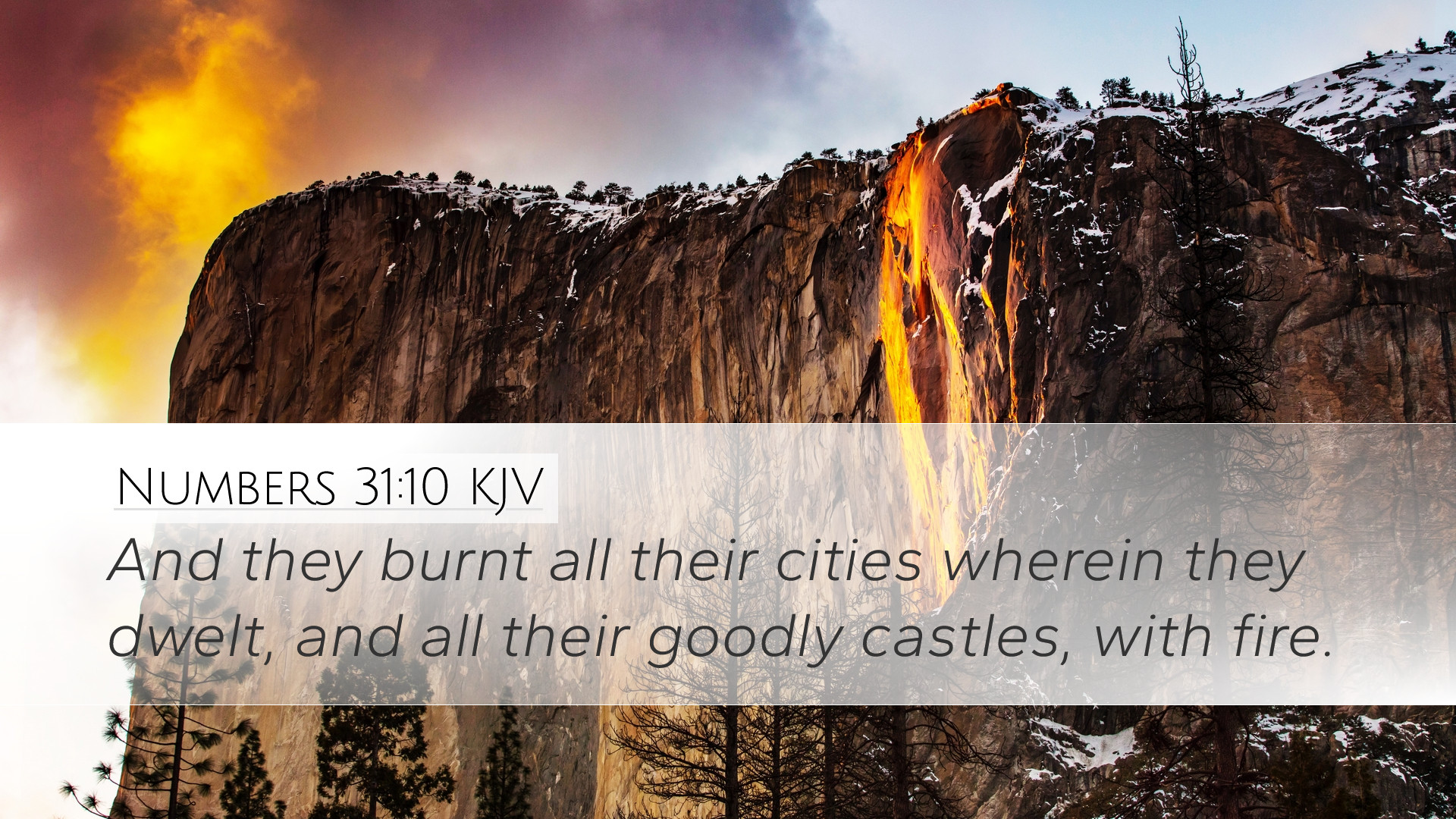Bible Commentary on Numbers 31:10
Contextual Overview:
The Book of Numbers describes the journey of the Israelites through the wilderness and serves as a record of their experiences, laws, and regulations that God commanded. Chapter 31 serves a critical role as it details God's direction concerning vengeance against the Midianites, who led the Israelites astray, and also marks a transition into the preparation of the Israelites for the Promised Land.
Verse Exegesis: Numbers 31:10
“And they burnt all their cities wherein they dwelt, and all their goodly castles, with fire.”
1. Historical Context
This verse refers to the Israelites executing God's judgment on the Midianites as commanded by Moses. The Midianites were significant players during Israel's sojourn, primarily known for leading the Israelites into idolatry, which initiated God's wrath. This incident serves as a harsh reminder of the consequences of sin and the importance of obedience to God’s commandments.
2. Theological Significance
The destruction of the Midianite cities signifies God's judgment against sin. In the Old Testament, fire often symbolizes divine judgment and purification. Commentators such as Matthew Henry emphasize that such divine purging is crucial for maintaining holiness among God's people. The complete destruction reflects God's intolerance of sin and provides a vivid picture of the seriousness of rebellion against Him.
3. Commentary Insights
-
Matthew Henry:
Henry notes that the action taken by the Israelites represents the fulfillment of God's judgment and underscores the idea that sin cannot go unpunished. He delves into the biblical idea of destruction as a means of societal purification, suggesting that such drastic measures were necessary to eradicate the influences that could lead God's people away from Him.
-
Albert Barnes:
Barnes highlights that the Israelites' military actions were divinely sanctioned, illustrating that God often employs human instruments to carry out His will. He argues that the annihilation of the Midianites serves as a warning against making alliances with those who oppose God's purposes for His people. The cities, described as "goodly castles," represent the allure of worldly possessions and comforts, which can entrap God's people.
-
Adam Clarke:
Clarke notes the practical implications of this verse in understanding the severity of God's commands. He articulates that the burning of the cities was not just a physical act of destruction but also a spiritual declaration against the idolatry practiced by the Midianites. Clarke emphasizes that such actions call for reflection among believers regarding the spiritual allegiances that they entertain.
4. Application for Today’s Believers
The message contained within Numbers 31:10 is rich in its applicability to believers today. Here are some key takeaways:
- Call to Holiness: The destruction of the Midianite strongholds serves as a reminder that we, too, must be vigilant against sin and its influences. Just as the Israelites were called to cleanse the land, modern believers are called to guard their hearts and fellowship against any form of idolatry.
- Divine Judgment: The verse reinforces the concept that God's judgment is real, and it serves to remind us of the importance of repentance. God’s judgment is not simply for punishment but is also a form of divine intervention aimed at restoration.
- Resisting Temptation: The actions taken against the Midianites reflect the need for Christians to recognize and resist the temptations to engage with worldly philosophies and practices that contradict the teachings of Scripture.
5. Conclusion
Numbers 31:10 presents a stark scene of judgment that resonates with themes of sin, judgment, and the need for holiness. Through the insights provided by public domain commentators, we see a multifaceted interpretation that challenges believers to examine their lives critically regarding sin’s presence. The call to purge both personal and communal sin remains relevant and vital in our pursuit to honor God and uphold His standards in today's world.


